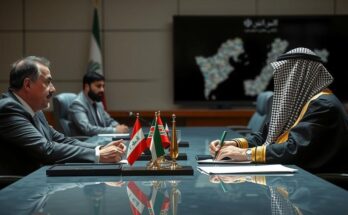Laotian Prime Minister Sonexay Siphandone transferred ASEAN’s chairmanship to Malaysian Prime Minister Anwar Ibrahim, recognizing Laos’ successful leadership amid challenges like the Myanmar junta and South China Sea tensions. As Malaysia prepares for its term, there is hope for enhanced ASEAN cooperation, with urgent issues such as Timor-Leste’s accession and Myanmar’s unrest on the agenda.
On October 14, 2024, Laotian Prime Minister Sonexay Siphandone officially transferred the ASEAN chairmanship to Malaysian Prime Minister Anwar Ibrahim, concluding a series of significant summit meetings in Vientiane. Laos has received commendations for its commendable leadership of ASEAN during the past year, despite its smaller geographic and economic stature compared to Indonesia, the region’s largest economy. Under PM Siphandone’s guidance, Laos adhered to the principles established at the previous ASEAN summit in Jakarta, demonstrating its political and economic influence in the region. Critics had anticipated a lenient approach from Laos regarding the Myanmar military junta, which has been excluded from participating in official ASEAN discussions due to its non-compliance with the five-point consensus aimed at restoring peace and democracy. However, the junta was represented at the summit by sending a career diplomat only after securing the agreement of all ASEAN leaders. During the East Asia Summit, which includes ASEAN’s dialogue partners such as China and Japan, leaders issued a joint statement addressing critical matters, including the situation in the Korean Peninsula and the ongoing conflict in Ukraine. With regard to the South China Sea territorial disputes, ASEAN leaders urged restraint from all involved parties. Malaysia is set to commence its ASEAN chairmanship in January, unveiling an official logo along with the theme “Inclusivity and Sustainability” for its leadership period. PM Anwar possesses extensive knowledge of ASEAN affairs, and there is optimism that he will tackle unresolved issues of the bloc and strengthen its foundations towards achieving the 2045 vision. Moreover, with Prabowo Subianto incoming as Indonesia’s president, a shift towards a more active ASEAN engagement approach is anticipated, especially following the tenure of outgoing President Joko “Jokowi” Widodo, who notably missed the summit. Several pressing topics await prompt attention, notably the ongoing civil strife in Myanmar. Newly elected Thai PM Paetongtarn Shinawatra has offered to facilitate an informal meeting regarding Myanmar’s situation, advocating for the inclusion of major neighbors like China and India in efforts to cease the violence from both military and rebel factions. In addition, expediting the accession of Timor-Leste to ASEAN is deemed essential. Both PM Siphandone and PM Anwar have pledged to formalize Timor-Leste’s membership quickly, especially after the attendance of Timor-Leste’s PM Xanana Gusmao at the summit. With international support to meet ASEAN’s entry requirements, the rationale for delaying Timor-Leste’s membership has diminished, especially given that Singapore has softened its previous resistance. Lastly, Laos’ chairmanship did not yield a subservient stance to China, unlike Cambodia’s previous approach. Both ASEAN and China have committed to hastening discussions on a non-binding Code of Conduct for the South China Sea, and it is hoped that this commitment will translate into effective measures for fostering trust and regional stability.
The Association of Southeast Asian Nations (ASEAN) is a regional intergovernmental organization comprised of ten Southeast Asian countries. The organization was established to promote political and economic cooperation and regional stability. The chairmanship of ASEAN rotates annually among its member states, and each chair nation sets the agenda and priorities for the organization during its term. Laos recently served as chair, with its tenure marked by significant developments in regional diplomacy, particularly concerning troubling issues such as the situation in Myanmar and tensions in the South China Sea. The transition of leadership to Malaysia marks a new phase for ASEAN, with member states hopeful for a renewed commitment to cooperation and progress in areas of mutual concern.
In conclusion, the recent transition of ASEAN chairmanship from Laos to Malaysia underscores a pivotal moment for the regional bloc. Laotian Prime Minister Sonexay Siphandone’s leadership was marked by adherence to established principles and a proactive approach to regional issues, particularly concerning Myanmar and the South China Sea. As Malaysia prepares to assume its role in January with a focus on inclusivity and sustainability, there is cautious optimism for a more dynamic and engaged ASEAN under the guidance of PM Anwar. Additionally, pressing issues, including Timor-Leste’s accession and the ongoing South China Sea disputes, require immediate and collaborative responses from all member nations. This leadership shift could potentially pave the way for stronger regional unity and more effective responses to shared challenges.
Original Source: asianews.network




